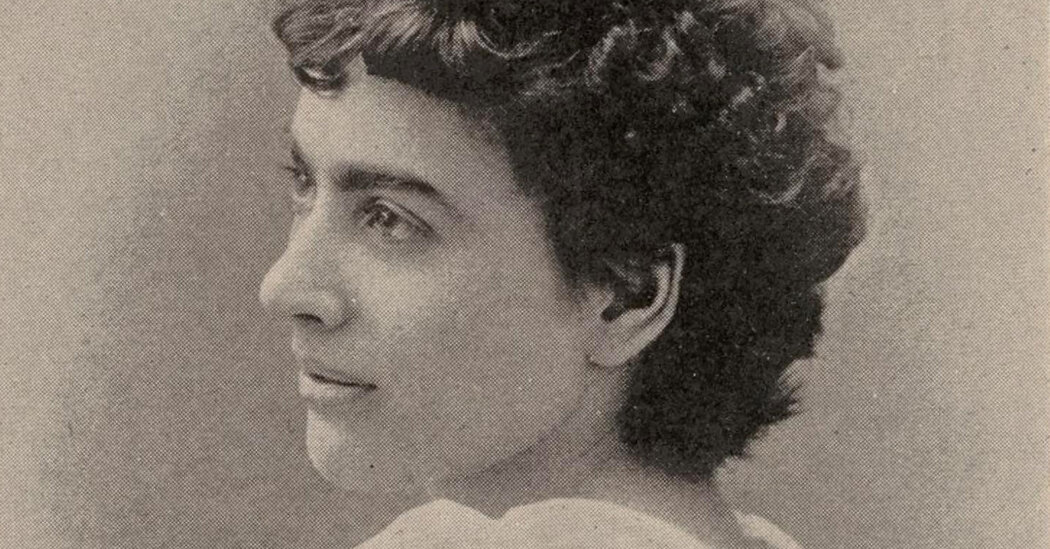This text is a part of Neglected, a sequence of obituaries about outstanding folks whose deaths, starting in 1851, went unreported in The Instances.
When Charles Darrow, an unemployed salesman in Philadelphia, discovered a couple of new board recreation that was turning into common, he requested his pals to sort up the principles and assist him jazz up the graphic design. In 1933, he copyrighted the sport, Monopoly, as his personal invention and commenced promoting it in toy shops and malls.
The sport, which concerned actual property buying and selling, would go on to promote greater than 275 million copies, has been licensed in a whole lot of spinoff editions and has turn out to be a part of the material of American life. It additionally made Darrow a millionaire. However credit score for the concept behind it mustn’t have been his. Somewhat, it belonged to a girl from Illinois with a flexible résumé that included writing, performing, engineering and dealing as a stenographer: Lizzie Magie.
The premise of Magie’s recreation, initially known as The Landlord’s Sport, could be acquainted to anybody who has performed Monopoly: Individuals transfer their tokens across the perimeter of a sq. board, shopping for actual property alongside the way in which, which they’ll use to cost lease to different gamers. Magie patented her invention in 1904 — the identical day that the Wright brothers filed one for his or her airplane — and it was revealed in 1906 by the Financial Sport Firm, of which she was an proprietor.
In her patent utility, Magie wrote, “Every time a participant goes across the board he’s purported to have carried out a lot labor upon Mom Earth, for which after passing the beginning-point he receives his wages, 100 {dollars}.”
Magie designed the sport with two units of guidelines: one which rewarded the gamers when assets have been shared equally, and one other the place the winner was the land baron who acquired probably the most wealth. Both manner, she hoped that gamers would take into consideration the underpinnings of capitalist society.
Elizabeth Jones Magie was born on Could 9, 1866, in Macomb, Unwell., to a political household. In line with Mary Pilon’s 2015 guide, “The Monopolists,” her father, James Magie, was an abolitionist newspaper writer who reported on the 1858 Lincoln-Douglas debates. Her mom was Mary (Ritchie) Magie.
At varied factors, Magie was a poet; a stenographer on the Useless Letter Workplace, the place mail thought of undeliverable landed; a comedic stage actress; an engineer who invented and patented a tool that improved the move of paper in typewriters; and a fiction author. Her brief story “The Theft of a Mind,” revealed in Godey’s, a ladies’s journal, was a couple of author who finds success after unlocking her potential underneath hypnosis solely to find that her hypnotist had plagiarized her novel.
Magie conceived of The Landlord’s Sport as an ideological instrument: a recreation that may train folks in regards to the ideas of the political economist Henry George. The central tenet of Georgism was that folks ought to preserve all that they earned, however that the federal government must be funded by a tax on actual property house owners, since land rightly belonged to everybody. A society funded by a single land tax, George believed, would get rid of each lower-class poverty and industrial cartels.
Within the guidelines of The Landlord’s Sport, Magie defined how potential conflicts could possibly be resolved: “Ought to any emergency come up which isn’t lined by the principles of the sport, the gamers should settle the matter between themselves; but when a participant completely refuses to obey the principles as above set forth he should go to jail and stay there till he throws a double or pays his fantastic.”
The Landlord’s Sport wasn’t a blockbuster hit, nevertheless it developed pockets of followers, together with utopian Quakers in Delaware and fraternity brothers at Williams Faculty in Massachusetts; the sport was even tailored for the British market underneath the identify “Brer Fox an’ Brer Rabbit.”
It wasn’t Magie’s solely creation: She invented a number of card video games, together with a role-playing one known as Mock Trial, which she offered to Parker Brothers in 1910. That 12 months, she additionally tried to promote them The Landlord’s Sport, however the firm deemed it too advanced.
By then, she had additionally obtained some nationwide consideration for a publicity stunt she had carried out in 1906, when she positioned a newspaper commercial providing herself on the market as a “younger girl American slave,” with “massive gray-green eyes, full passionate lips” and “splendid enamel” who was “not lovely, however very enticing,” and describing herself as “trustworthy, simply, poetical, philosophical.”
The advert was meant to be a commentary on slavery and the grim financial prospects of single ladies, nevertheless it as an alternative led to undesirable marriage proposals and a proposal of employment with a freak present. (Magie in the end did get married, on the age of 44, to Albert Phillips, a businessman.) It additionally led to correspondence with the muckraking author Upton Sinclair and work as a newspaper reporter.
Within the meantime, gamers have been changing The Landlord’s Sport into selfmade units, copying the board onto wooden or fabric, tweaking the principles and calling it “the monopoly recreation.” When devotees taught pals how one can play, newcomers had no concept that the handmade recreation was Magie’s invention.
Monopoly’s ties to Magie have been additional misplaced to historical past when Darrow offered his model, which included the names of areas within the thriving seaside resort of Atlantic Metropolis, N.J., to Parker Brothers in 1935, he claimed that he had invented it to entertain his household in the course of the Nice Melancholy. A plutocratic fantasy was precisely what Individuals wished throughout that period. Tens of millions of copies have been offered, saving a then-struggling Parker Brothers from chapter and making Darrow a wealthy man.
Many profitable video games, together with Tiddlywinks and Battleship, have been created as business variations of homespun diversions, but when a recreation is within the public area, any writer can print its personal model.
Trying to squash potential competitors and set up a Monopoly monopoly, Parker Brothers acquired related video games The Landlord’s Sport and spinoffs like Finance.
Magie offered the rights to The Landlord’s Sport to Parker Brothers for a flat $500, about $11,000 immediately; the agency additionally agreed to publish two of her different board video games, King’s Males, a tile-matching recreation, and Cut price Day, a purchasing recreation. Delighted that her Georgist concepts would attain a wider viewers, she wrote a letter to Parker Brothers wherein she addressed The Landlord’s Sport as if it have been an individual: “Farewell, my beloved brainchild. I regretfully half with you, however I’m supplying you with to a different who will be capable of do extra for you than I’ve carried out.”
Though Parker Brothers, which Hasbro purchased in 1991, reprinted The Landlord’s Sport, it quickly fell out of print once more, eclipsed by Monopoly. Magie had no declare on royalties, and Parker Brothers promoted Darrow as Monopoly’s sole inventor.
Magie’s landmark contributions to American tradition and recreation design have been expunged till the Nineteen Seventies, when Ralph Anspach, the inventor of a recreation known as Anti-Monopoly, unearthed her work throughout a authorized battle over trademark infringement with Parker Brothers.
Magie died at 81 on March 2, 1948, in Staunton, Va., however she lived lengthy sufficient to see the enduring success of a recreation based mostly on her personal invention, even when her identify had been erased and her ideology toned down.
The Night Star newspaper of Washington, D.C., which had interviewed Magie in 1936, summarized her view: “If the refined propaganda for the one tax concept works round to the minds of the 1000’s who now shake the cube and purchase and promote over the ‘Monopoly’ board, she feels the entire enterprise won’t have been in useless.”




